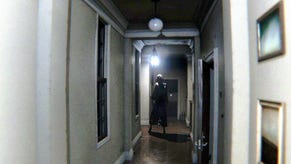Get Out of My Brain, Silent Hill
Pete ponders the virtues of one of the most overlooked entries in the Silent Hill series.
This article first appeared on USgamer, a partner publication of VG247. Some content, such as this article, has been migrated to VG247 for posterity after USgamer's closure - but it has not been edited or further vetted by the VG247 team.
The poor old Wii had it tough when it came to being taken seriously by self-professed "hardcore" gamers.
And yet those who were willing to look past its inferior technology and low-resolution graphics will know that amid all the shovelware minigame compilations were some of the best games of the generation -- many of which were exclusive to Nintendo's platform, at least initially.
Silent Hill: Shattered Memories is one of those games -- while it did eventually see a release on PlayStation 2 and PSP, the Wii version is the way this game was clearly intended to be played. And that's sort of fitting, really -- much as the Wii's catalog of great games was often overlooked by a significant proportion of "hardcore" gamers, so too were later installments of the Silent Hill franchise overlooked by those who found themselves disappointed with the entries immediately following the initial four games.
The Silent Hill series has, over its history, been seemingly torn in two different directions. On the one hand, we have the angle that the first and third games in particular take -- the story of the town itself, and the cultish, demonic activity therein. These games, while good, sometimes err on the side of clichéd horror tropes such as giant monsters, mysterious symbols and deranged cultists. That's not to say there's no value in them -- they're just as full of deeply symbolic content as the other entries in the series, and 3 in particular is simply a solid survival horror game generally -- but the people who really love Silent Hill don't tend to come to these games for slobbering, horrific monsters. Instead, they come for that other angle: the lurking sense of unease and discomfort that comes through deep, psychological explorations of tragically flawed characters; horror that comes from the unseen rather than the explicit; thought-provoking stories that are by turns engaging, upsetting and genuinely disturbing.
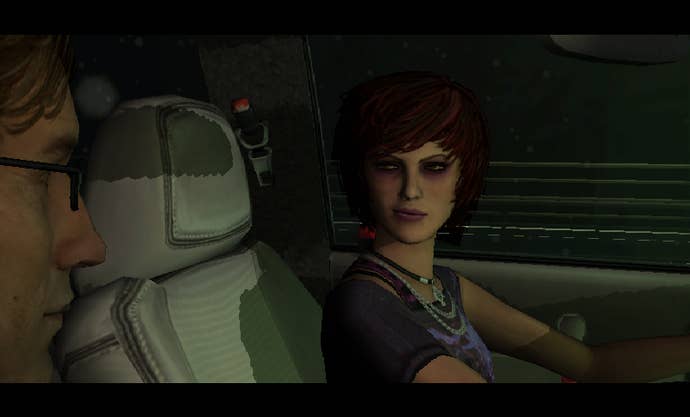
For many fans, Silent Hill 2 was the high point of the series. Telling the intensely personal story of James Sunderland on his quest to discover the truth behind a letter apparently from his dead wife, Silent Hill 2 was a real fever dream of a game where you could never be sure what you were seeing was real. It was confusing, disorientating and deliberately clunky; its scares and discomfort tending to come from horrifying realizations you, the player came to yourself rather than information you were spoon-fed by the game. It was packed with symbolism -- some more obvious than others -- and it respected your intelligence to figure things out for yourself rather than feeling the need to explain everything.
It set a high bar for the series, in short -- one that some don't think it's ever managed to leap over since, particularly once the series moved out of the hands of Konami's in-house development team. 2008's Silent Hill Homecoming in particular -- developed by Double Helix of Xbox One's Killer Instinct fame -- was criticized for seemingly missing the point of the series somewhat, instead feeling very much like an American horror movie rather than the distinctively Japanese feel of the earlier titles.
Shattered Memories followed two years after Homecoming, and it's very clear it was intended to be something of a "reboot" for the series. It's not regarded as canonical in the grand scheme of franchise's overarching plot, however; it begins with a retelling of the first game's premise before shooting off in a completely different direction -- one which, for my money, is far more interesting than the original's cult-hunting.
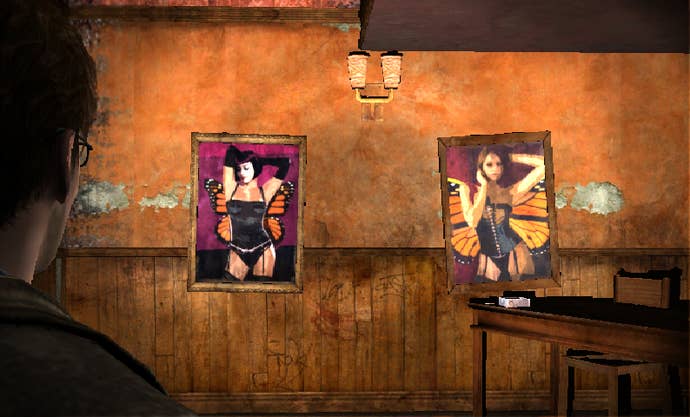
In Shattered Memories, as in Silent Hill 1, Harry Mason and his daughter Cheryl become separated in the titular town after a car accident, and weirdness ensues. However, the way it's framed is entirely different between the two games. While the first Silent Hill game suggests that you're playing the role of Harry "live," as it were, Shattered Memories flip-flops back and forth between Harry's scenes and first-person sections in which you're undergoing psychotherapy with a mildly creepy therapist, with the implication being that Harry's scenes are flashbacks. This isn't altogether accurate, but to explain further would constitute some fairly hefty spoilers and I'm trying to convince you that this game is worth playing here, so I'll refrain for now.
What does become clear remarkably quickly, however, is that your responses to the therapist in the first-person sections -- given either by mutely nodding or shaking your head using the Wii Remote, or occasionally interacting with handouts on the therapist's table -- have subtle impacts on the sections where you're controlling Harry from the third person. An early sequence sees you coloring in a picture of a happy family standing outside their house, for example; a few moments later, Harry comes across a house that is eerily painted in the same gaudy colors you scrawled on the piece of paper earlier.
The way you behave as Harry influences the game in subtle ways, too -- the game is constantly watching how you behave, and gradually building up a hidden "personality inventory" that tracks your attitude towards sexuality, friendship, family and alcohol as well as how honest you've been. These stats have various impacts on gameplay to varying degrees, ranging from changing the appearance of characters to the way Harry interacts with them in cutscenes. At various points, the game will branch in several different directions according to which of these items is at the highest level, and the final ending is determined by the combination of everything you've done and all the answers you gave in the psychotherapy sessions.
Building up items in your "personality inventory" isn't as simple as picking particular options when given explicit choices, either -- the sexuality statistic, for example, tracks how often you focus the camera on anything vaguely suggestive or erotic as well as the way you interact with things that have an air of suggestiveness about them.
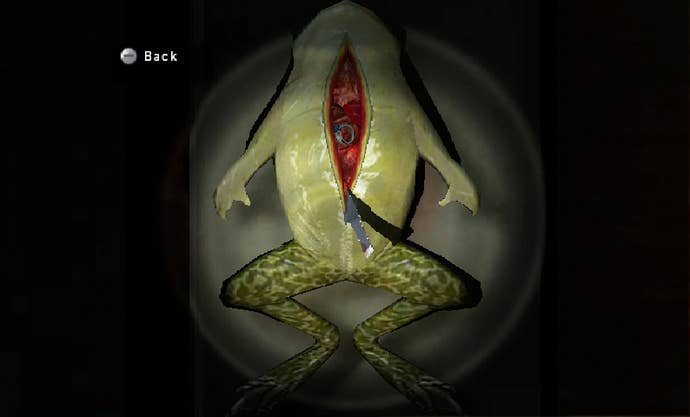
What's particularly interesting about this gameplay mechanic -- aside from the fact that it's a little different from the usual "if you choose this option, you'll get this ending; if you choose the other one, you'll get that ending" system -- is that it's not just tracking statistics, it's actually psychologically profiling you. At the game's conclusion, you're presented with its interpretation of your personality -- or at least the personality you put across through your actions. Granted, given there's only a relatively limited set of data the game can work with -- along with the fact it's a game, not a real therapist -- the accuracy may be questionable and some people may find it doesn't "work" for them at all. But on my first playthrough, in which I answered everything as honestly as if I was the person actually sitting on the therapist's couch, the psychological profile the game presented me with as the credits rolled was eerily accurate.
My only real criticism of Shattered Memories, paradoxically, comes from something I also like to praise it for: the lack of combat. Unlike other Silent Hill games, which have tended to star relatively "normal" people who were inexplicably highly skilled with various types of melee and firearm weapons, Shattered Memories features no combat whatsoever. Instead, the game's "nightmare" sequences see the world freezing over, and your task changing from "find useful things or information" to "RUN AWAY!" There are monsters wandering around, but you can't fight them -- you can just shake them off if they attack you. While these sequences do initially instil a genuine sense of panic and fleeing from unknown horrors, the fact that it's often not particularly clear where you need to go can be frustrating; these parts tend to stop being quite so scary after you've been running around in circles for twenty minutes without suffering any injuries.
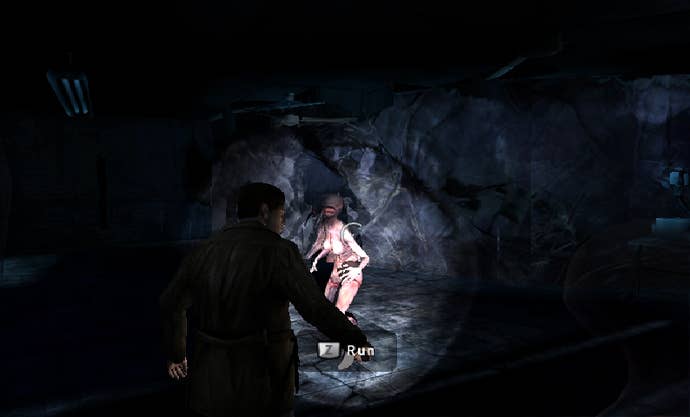
This aside, though, Shattered Memories is still an extremely solid game that makes excellent use of the Wii's unique control scheme and other features. Taking phone calls through the speaker in the Wii Remote is a nice, highly atmospheric touch, and the point-and-click controls work well with the Remote and Nunchuk combo. I can't speak for the PS2 and PSP versions as I haven't tried them, but even without these cool technological features, the psychological profiling and thought-provoking story is still worth a look -- and it's an angle I sincerely hope the series returns to in the future.
Will it? That remains to be seen; the last few Silent Hill games appear to have all been somewhat experimental in nature -- particularly the bizarre shift to cooperative dungeon crawling for the recent Vita game -- so it's not beyond the realm of possibility. But until we find out for sure where the series is going, Shattered Memories is certainly worthy of a few hours of your time if you haven't explored it already.
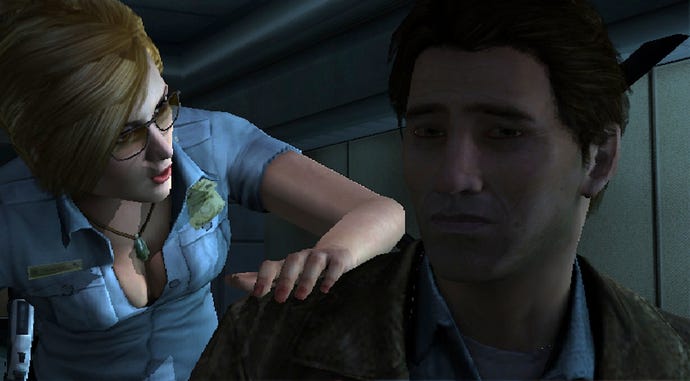
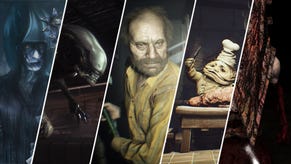
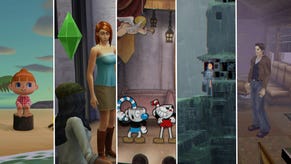

.jpg?width=291&height=164&fit=crop&quality=80&format=jpg&auto=webp)

.jpg?width=291&height=164&fit=crop&quality=80&format=jpg&auto=webp)
